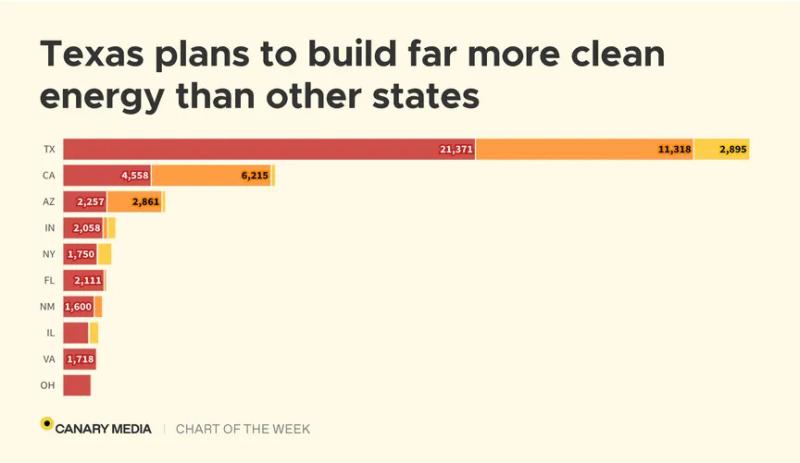Chart: Texas plans to build the most clean energy of any state
By: Dan McCarthy (Canary Media)


The less restrictive regulatory environment in Texas has encouraged more rapid adoption of both wind and solar energy. Energy friendly government policy has allowed Texas to surpass California in green generating capacity over a short period of time. The lesson learned from Texas should be that regulation can be a hinderance to transiting to alternative energy. (Regulations should be carefully designed and carefully imposed.)
However, the real world results in Texas point to two serious problems. The first problem is that the Texas electrical grid has been isolated from the national grid to avoid Federal regulations. Texas has used that autonomy to its advantage by fostering rapid deployment of generation capacity. The results speak for themselves. But that regulatory advantage has limited the benefit to Texas.
The second problem highlighted by the real world experience in Texas has been that electricity consumption has increased at pace with increased green generation. Energy friendly government policy has attracted electricity intensive businesses to build their own generation in Texas to green their business activities. (BTW, that's a good thing. We really do want businesses to be greener.) The consequence is that Texas has not been able to displace or replace carbon emitting electricity generation as alternative generation has been added. That has been a nagging general concern about transitioning to alternative energy; the added generating capacity may only spur increased consumption.

Canary Media's chart of the week translates crucial data about the clean energy transition into a visual format. Canary thanks Clean Energy Counsel for its support of the column.
Texas has become an all-around clean energy juggernaut, thanks to its lax permitting regime, fast grid-interconnection process, competitive energy market, and ample amount of solar- and wind-friendly land.
Its plans for the next year and a half underscore that status. As of July, the state intended to build 35 gigawatts of clean energy over 18 months, more than the next nine states combined, according to a Cleanview analysis of U.S. Energy Information Agency data.

Texas has long been the biggest player in U.S. wind energy. But in recent years, energy developers have raced to build solar in Texas too. Five years ago, the state had connected just 2.4 gigawatts of utility-scale solar to its grid; as of this past June, it had installed almost 22GW of solar, per an American Clean Power report released this week. That's nearly 10 times as much as back in 2019, and enough to propel Texas past California for large-scale solar installations.
Now Texas is writing its next chapter on clean energy: The state has become the nation's hottest market for grid batteries as energy developers chase after its cheap solar and wind energy.
Given its staggering construction plans, Texas is set to only further solidify its place at the top of the clean energy leaderboard. But the rapid rise of the state's clean energy sector has not yet yielded an outright energy transition, as the writer Ketan Joshi points out.
Though Texas has built more large-scale clean energy than any other state in absolute terms, it lags behind California — and plenty others — in terms of how clean its grid actually is. The Golden State met over half its electricity needs with renewables in 2023, per Ember data, while clean sources generated just 28 percent of Texas' power. Electricity produced in the Lone Star State remains slightly more carbon intensive compared with the U.S. average.
Part of the story here is that, largely thanks to data centers and bitcoin mines, Texas is seeing some of the fastest growth in electricity demand of any state. That means much of the new solar, wind, and battery storage it's building is just meeting new demand and not necessarily booting dirty energy off the grid.
The other hurdle preventing Texas from cleaning up its grid faster is the entrenchment of the fossil fuel industry in its local politics. Last year, the state passed a law creating a taxpayer-funded program to give energy developers billions of dollars in low-interest loans to build several gigawatts' worth of new fossil-gas power plants.
In other words, the Lone Star state's fossil fuel buildout isn't ending even as its clean energy sector takes off. For Texas to be considered a true leader on decarbonizing the power sector — and not just a state that builds lots of everything — that will need to change.
Clean Energy Counsel is the only mission-driven law firm exclusively focused on renewable energy and clean technologies. From early-stage venture investment, offtake, site control, equipment supply and EPC contracting, through project acquisitions, debt and tax equity, we counsel clients through every stage of the project life cycle. Visit our website to explore how we can work together toward a sustainable future.




There is no denying that Texas overwhelmingly leads the country in deployment of alternative energy. The energy friendly regulatory environment may have fostered such a rapid deployment of green generating capacity. Few restrictions and regulations can speed the transition to alternatives.
But the regulatory autonomy of Texas hasn't provided national benefit. What's worked so well in Texas has only benefited Texas because of the need to isolate from the Federal regulatory environment. Texas also provide proof that "if you build it, they will come." Texas is attracting energy intensive businesses because it's easier to build dedicated generating capacity and easier to connect to the grid. (BTW, that really is a good thing because we want businesses to be green. But we should be concerned about all our businesses relocating to Texas.)